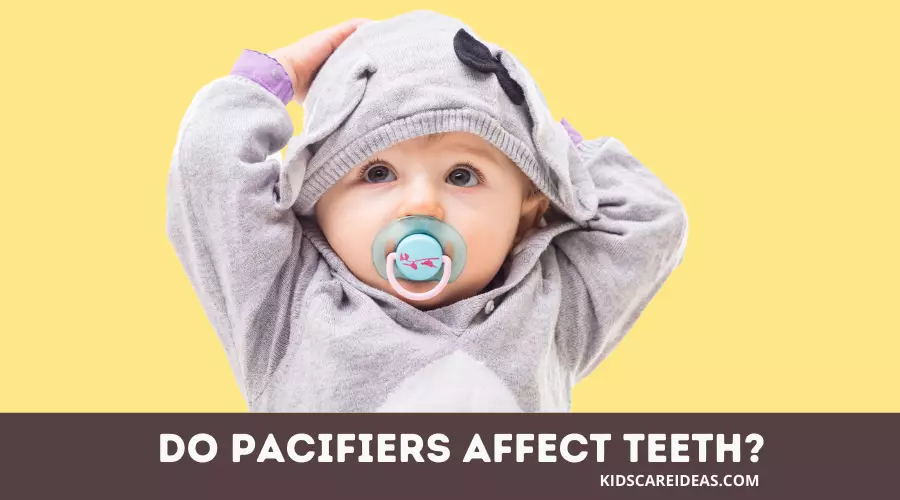Pacifiers have become a popular recommendation for new parents to use with their infants.
This is because they are inexpensive, easy to clean, and the child will stop crying if given one.
But do pacifiers affect teeth? This is a very common question.
It is not just the thumb that babies prefer to suck on but also pacifiers. Pacifiers are a great way to help calm a fussy baby down.
So when it comes to pacifiers, you have to make sure that you choose the right one as it may affect your baby’s teeth.
Let’s get started!
What is a Pacifier?
Pacifiers, also called dummies, binkies, or soothers, are used to calm a crying baby or help it go to sleep.
A pacifier is a small piece of plastic or rubber in the shape of a nipple or a teat designed to be used by infants to suck on.
Pacifiers are used by babies to suck on and help them stop crying. Pacifiers are made of rubber, latex, silicone or plastic.
Older children and adults also use it for soothing, comfort, and communication.
The pacifier has been around since the early 1900s, but it was not until the 2nd World War that it became popular.

Do Pacifiers affect teeth?
Pacifiers may cause dental problems and change the shape of teeth.
The sucking motion of the pacifier can create an overbite, which can result in crooked teeth later on in life.
If the baby refuses to stop using the pacifier, they should at least be put to bed with it.
The child should also not keep a pacifier in their mouth all day long.
Studies show that babies who use pacifiers often have a higher incidence of tooth decay than those who do not.
This may be because the baby’s tongue is often too large to reach the back of the mouth and therefore unable to clean the teeth.
If you’re concerned about your infant having tooth decay, then consider getting them a bottle instead of a pacifier.
Do Pacifiers cause teeth problems?
Pacifiers are one of the best inventions of the modern era, and they are a great way to soothe a crying baby.
Still, despite the use of pacifiers, there are a lot of concerns about whether or not they are responsible for causing a myriad of problems.
For instance, there is a concern that pacifiers cause teeth problems.
It’s important to know that pacifiers are not the only cause of baby teeth problems, but they can play a role in causing problems with your child’s teeth.
Since pacifiers are always in a child’s mouth, they can lead to tooth decay.
The problem with Pacifier includes:
- Tooth decay
- Gingivitis and gum disease
- Tooth loss
- Sore gums
Do Pacifiers change the shape of teeth?
Pacifiers can cause baby teeth to change shape in three ways:
- They can cause a baby’s tooth to shift toward the front of the mouth.
- They can cause a baby’s tooth to grow in the opposite direction of normal.
- They can affect how a baby’s tooth erupts, causing it to erupt sooner or later than expected.
The reason for this is simple. As a child sucks on the pacifier, the teeth are pushed out of place, which can eventually change the shape of the child’s face.
However, the pacifier does not affect your child’s permanent teeth.
How do you tell if a pacifier is messing up teeth?
On prolonged use of a pacifier, you need to check if the baby’s teeth look good and do not look deformed.
It is advisable to have your baby a regular checkup from your nearby dentist.
You will get to know if the regular wear of the Pacifier is impacting your baby teeth in terms of cavities or deformation that may happen.
Can braces fix pacifier teeth?
Dentists give braces to get your teeth to a shape if they are misaligned, like Pacifier teeth. Using braces regularly as recommended by the dentist can help fix Pacifier teeth.
You need to visit your nearby dentist, and then you can decide on the duration to wear braces and the treatment after that.
What kind of Pacifier is best for teeth?
The pacifier that you choose will depend on many factors.
- Your child’s age
- Your child’s size
- Your child’s preference
- The shape of your child’s mouth
Orthodontic pacifiers do not have any issues with the teeth, and they are good for your baby.
- Shaped and sized for newborns
- Breast-like nipple shape naturally fits baby's...
- NUK orthodontic nipple shape helps promote healthy...
- Orthodontic nipple shape is asymmetrical with a...
- Natural shape is modeled after mom’s nipple...
- Heart-shaped shield fits perfectly under baby’s...
- Pacifiers 0-3 months distributed in hospitals...
- Orthodontic pacifier with symmetrical nipple that...
- 100% medical grade silicone: made entirely from...
- Actively supports baby’s breathing
- Clinically developed, tested, and approved in...
- Extra-soft, satin-textured silicone nipple for...
What do Pacifier teeth look like?
Pacifier teeth are the misaligned teeth that form when children use a pacifier for an extended period of time.
The habit of sucking on a pacifier, a thumb, or a blanket can lead to crooked teeth, and there may even be a gap in the teeth.
How to fix Pacifier teeth?
Some dentists believe removal should be done as soon as possible, while others feel it is better to wait until your child has grown a bit and the permanent teeth have started to come through.
FAQs on Do Pacifiers Affect Teeth
Q: How many hours should the baby use a pacifier?
Ans: A baby should use a pacifier for less than 6 hours per day. Also, you should stop prolonged usage of the pacifier.
Q: Can pacifiers cause crooked teeth?
Ans: When used for a long time, a Pacifier can cause uneven, crooked teeth in your baby.
Q: Can pacifiers cause jaw problems?
Ans: Prolonged Pacifier use can cause your baby’s Jaw to misalign.
Q: Does a pacifier cause underbite?
Ans: Prolonged Pacifier use can cause misalignment of teeth and can cause an underbite.
Conclusion
Let’s conclude the post on whether pacifiers do affect teeth!
Pacifiers are one of the best things that can ever happen to your baby, and they make the baby feel relaxed and peaceful.
Pacifiers are one of the easiest ways to relieve anxiety and make the baby sleep.
While pacifier use can cause dental problems, the effects are not significant in controlled use.
The benefits of pacifier use outweigh the disadvantages, so parents should consider this before deciding.
I hope you enjoyed reading the post.




